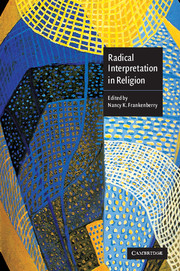Book contents
- Frontmatter
- Contents
- Notes on the contributors
- Preface
- Acknowledgments
- PART I PRAGMATICS
- Introduction
- 1 Saving belief: on the new materialism in religious studies
- 2 Radical interpretation and pragmatism: Davidson, Rorty, and Brandom on truth
- 3 Cultural politics and the question of the existence of God
- 4 Religious belief and naturalism
- PART II CULTURE AND COGNITION
- PART III SEMANTICS
- Select bibliography
- Index
3 - Cultural politics and the question of the existence of God
Published online by Cambridge University Press: 13 November 2009
- Frontmatter
- Contents
- Notes on the contributors
- Preface
- Acknowledgments
- PART I PRAGMATICS
- Introduction
- 1 Saving belief: on the new materialism in religious studies
- 2 Radical interpretation and pragmatism: Davidson, Rorty, and Brandom on truth
- 3 Cultural politics and the question of the existence of God
- 4 Religious belief and naturalism
- PART II CULTURE AND COGNITION
- PART III SEMANTICS
- Select bibliography
- Index
Summary
CULTURAL POLITICS
The term “cultural politics” covers, among other things, arguments about what words to use. When we say that Frenchmen should stop referring to Germans as “Boches,” or that white people should stop referring to black people as “niggers,” we are practicing cultural politics. For our socio-political goals – increasing the degree of tolerance that certain groups of people have for one another – will be promoted by abandoning these linguistic practices.
Cultural politics is not confined to debates about hate speech. It includes projects for getting rid of whole topics of discourse. It is often said, for example, that we should stop using the concepts of “race” and “caste,” stop dividing the human community up by genealogical descent. The idea is to lessen the chances that the question “who are his or her ancestors?” will be asked. Many people urge that words like “noble blood,” “mixed blood,” “outcaste,” “intermarriage,” “untouchable,” and the like should be dropped from the language. For, they argue, this would be a better world if the suitability of people as spouses or employees or public officials were judged entirely on the basis of their behavior, rather than partially by reference to their ancestry.
This line of thinking is sometimes countered by saying “but there really are inherited differences – ancestry does matter.” The rejoinder is: there certainly are inheritable physical characteristics, but these do not, in themselves, correlate with any characteristics that could provide a good reason for breaking up a planned marriage, or voting for or against a candidate.
- Type
- Chapter
- Information
- Radical Interpretation in Religion , pp. 53 - 77Publisher: Cambridge University PressPrint publication year: 2002
- 6
- Cited by



